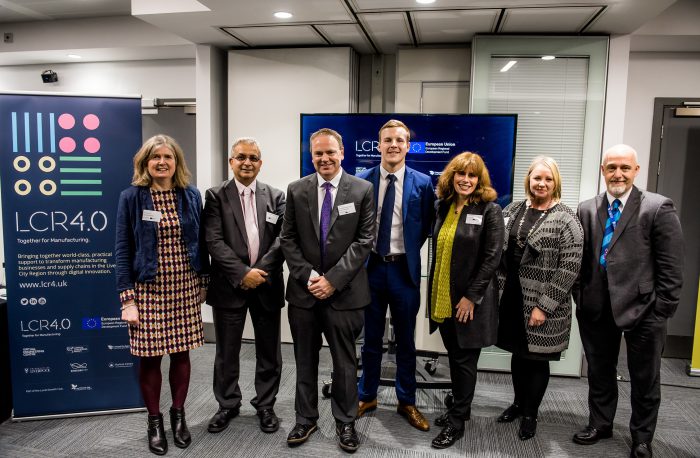LCR4 START supports over 140 businesses and 50 start-ups after just 2 years

Since the launch of the LCR4 START project in late 2019, the ERDF project has engaged with over 353 business owners and directors, offering bespoke support for 50 new business start-ups and 142 businesses.
Funded by the European Regional Development Fund (ERDF), LCR4 START is a £3.9m initiative designed to provide business and digitalisation support to SMEs across the Liverpool City Region for improved competitive advantage, building company resilience and effectively developing and delivering products and services. The initiative focuses on developing digital strategies whilst focusing on six key components (people skills, planning, leadership, supply chains, technology, and investment).
Despite the project’s first year facing difficulties of lockdown due to the global pandemic, this did not slow down the collaborative team made up of the Virtual Engineering Centre (University of Liverpool), Liverpool John Moores University, Science and Technology Facilities Council and the Growth Platform. In the project’s first year it supported over 70 SMEs and has only gone from strength to strength since, helping businesses to overcome existing and new challenges to ensure they remain competitive within a changing environment.
LCR4 START was designed to support at least two hundred businesses over three years following the legacy of LCR4.0, the primary project that supported over three hundred SMEs to unlock new opportunities through Industry 4.0 technologies such as virtual and augmented reality, Internet of Things (IoT) and additive manufacturing to name a few.
So far LCR4 START has created at least 28 additional jobs across 10 companies as another 57 companies have realised the opportunity for product line expansion and with the support of the LCR4 START team, have introduced new products to their firm to support long-term sustainability.
Unlike the LCR4.0 project, LCR4 START is not limited to traditional manufacturing companies and has supported businesses within an array of industries and sectors including beauty, healthcare, opticians, sportswear developers, dentist surgery and even a provider of church artefacts. The support so far has also been wide-ranging from across the region including Wirral, Halton, Birkenhead, St Helens, Southport, Widnes, Formby and more.
LCR4 START SUPPORTS HEALTHCARE
Drill Surgeries are an award-winning MedTech start-up who have challenged the long-standing approach to Intramedullary Nailing surgery to make the procedure safer whilst saving on resources such as time and money. Drill Surgeries approached the LCR4 START team to explore how virtual and augmented reality could improve the assessment of precise and accurate positioning of pins and steel rods as part of patient recovery. The company realised that by simply improving this, a typical secondary x-ray could be removed from this procedure, reducing the patient’s exposure to additional radiation and better financially supporting healthcare professionals.
“It was great to work with the LCR4 START team who have a background in supporting the healthcare industry… We are now developing our MedTech devices and tools further, using our digital strategy for ensuring we remain innovative, and our universal clients and patients can reap the benefits.”
Moises Barbera Ramos, CEO and Founder, Drill Surgeries
Click here for the downloadable case study.
LCR4 START SUPPORTS SUSTAINABILITY
Let’s Rethink This was supported by both the Science and Technology Facilities Council (STFC) and the Virtual Engineering Centre (VEC) as part of a collaborative support project. Business owner Laura Meehan wants to drive innovation and digital technologies for reducing our impact on the planet and its resources. In developing a deodorant, Laura was keen to explore sustainable and recyclable materials for developing a deodorant pod with a refillable deodorant core, reducing excess packaging.
The STFC team access their additive manufacturing facilities for creating a physical prototype of the product to support their product development and decision-making moving forward. The VEC’s digital engineers then developed a short animation including a virtual 3D model of the product, which rotates on an axel to give a realistic 360-degree view whilst instructing users on the ease of removing and replacing the deodorant sphere in the centre of the deodorant pod. This can not only be shared with users and customers in the future but used as a communication tool for potential investors.
“The support we have received from the LCR4.0 teams has been invaluable to us. As a start-up, resources can be limited so to have the teams dedicate their time and efforts for us has been fantastic. We have been able to not only develop our product with confidence, but we now have a modern and clear digital tool for communicating and marketing our product.”
-Laura Meehan, Let’s Rethink This
Click here for the downloadable case study.
Explore more

Together for manufacturing – the official launch of LCR 4.0
LCR 4.0, a brand new business support programme for the manufacturing sector officially launches in…

Moving Face to Face Delivery On-line Workshop Summary
On Wednesday 24th February 2021, the LCR4 START team at LJMU ran an online workshop,…

Made in Merseyside speakers back LCR 4.0
LCR 4.0 hosted the Made in Merseyside Breakfast with Insider Media a week after launching…